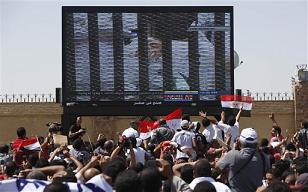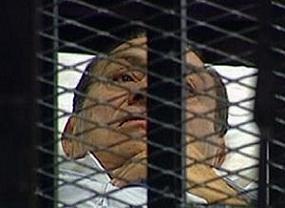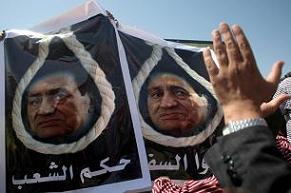Ousted Egyptian President Hosni Mubarak returns to court on Monday to face charges of corruption and intentionally killing protesters in the uprising that toppled his rule last February.
 Ousted Egyptian President Hosni Mubarak returns to court on Monday to face charges of corruption and intentionally killing protesters in the uprising that toppled his rule last February.
Ousted Egyptian President Hosni Mubarak returns to court on Monday to face charges of corruption and intentionally killing protesters in the uprising that toppled his rule last February.
If convicted of these charges, Mubarak, 83, would face death penalty.
Along with the toppled president, his sons, Alaa and Gamal who have been accused of corruption, would also be tried.
LEGAL ARGUMENT
 Monday's session of Mubarak's trial would likely to be dominated by legal arguments.
Monday's session of Mubarak's trial would likely to be dominated by legal arguments.
Defense lawyers say that any testimony by Field Marshal Mohamed Hussein Tantawi on Mubarak's role in trying to suppress the 18-day uprising, in which more than 800 people were killed, could decide the fate of the 83-year-old.
Tantawi, who was defense minister for two decades under Mubarak, heads the military council that took power when Mubarak left power on February 11.
Lawyers for the families of the demonstrators who were killed in the uprising have already asked for greater access to Mubarak's communication records.
The families want to know what orders he gave to his officials as police tried to stop the protests using brutal means, our correspondent says.
Mubarak has been reported to be in a poor state of health, and doctors have been constantly monitoring his medical condition at a military hospital near the capital. 
LAST COURT SESSION
Mubarak made his first court appearance on August 3 in a case which was at times unruly, with lawyers jostling and clamoring to be heard by the judge.
During the court session, some 3,000 soldiers and police were drafted in to maintain order.
The charges against the Mubaraks were read out in the previous session, and Hosni Mubarak and his sons each denied them.
"Yes, I am here," the ousted president said, raising his hand slightly when the judge asked him to identify himself and enter a plea. "I deny all these accusations completely."
The judge, Ahmed Refaat, also decided that the trial of Mubarak and his former Interior Minister, Habib al-Adly, would be merged, as demanded by the lawyers of families of those killed in Egypt's January-February uprising.
Refaat put a halt to live television broadcasts of the trial, which opened on August 3 with a brief session held on Monday that went into recess before the adjournment to September 5 was announced.
Mubarak was earlier flown in by helicopter and then driven in an ambulance to the court at a police academy in a Cairo suburb.
Mubarak, as in the first hearing, was placed reclined on the stretcher in the dock, exchanging brief words inside the cage with his two sons and co-defendants on graft charges, Gamal and Alaa.
More than 850 people were killed in the 18 days that led to Mubarak's ouster, and thousands more were wounded.
